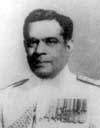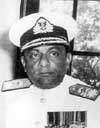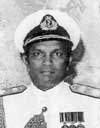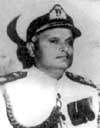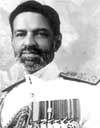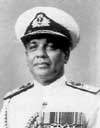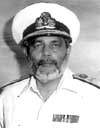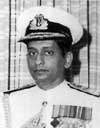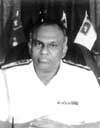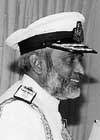 |
||||||||||||||||
|
Shock waves in Navy: Sandagiri's extension sinks six senio
The
Commander of the Sri Lanka Navy, Vice Admiral
Daya Wickrema Kumara Sandagiri created military history this week. Due to reach
his age of retirement after becoming 55 years on September 1, this
year, he sought a year's extension of service. The Ministry of Defence
duly recommended this to President Chandrika Bandaranaike Kumaratunga,
Commander-in-Chief. Conceding his request would have meant a retirement
on August 31, 2003, instead of next month. But the file was returned
from the Presidential Secretariat to the Ministry of Defence with
queries orclarifications. They were answered and the file sent back. And, last Monday
afternoon, the file was back from the Presidential Secretariat with
a decisive endorsement. President Kumaratunga, as Commander-in-Chief
had extended Vice Admiral Sandagiri's term of office by three years.
He will now remain as Commander of the Sri Lanka Navy until August
31, 2005 or until he reaches 58 years. What earned him this historic
reward is not clear but the move has set off shock waves in an already
divided and demoralised Sri Lanka Navy. In the Navy, which is over 64 years old now, not one single Commander has been granted an extension of service up to 58 years of age. That included the four Britishers who were Commanders since 1938 (in the Royal Navy, the precursors) and the ten Sri Lankans who have followed thereafter. Just two days
after winning the unprecedented extension of service, Vice Admiral
Sandagiri held a string of news conferences, individually talking
to journalists from various newspaper groups and TV stations. That was his
main engagement last Wednesday. It has been
customary in the past for service Commanders to obtain prior approval
from the Defence Secretary before such news conferences, interviews
or when making public statements on official matters. The former
Defence Secretary Chandrananda de Silva, followed this procedure
and Commanders who did not fall in line were reprimanded. Whether Vice
Admiral Sandagiri obtained such approval from Defence Secretary
Austin Fernando, before Wednesday's news conferences is not clear.
If indeed such
approval was obtained, one need hardly say, the embarrassment all
round was worst confounded by the declarations of the Navy Chief.
He literally usurped the role of his own Commander-in-Chief when
he declared that his extended tenure of three years "would
not affect the promotional prospects of the next six senior-most
officers below him." He vouched
that these six senior officers could receive promotions in due course
and even extensions of service when they reach 55 years, the age
of retirement - a declaration which could only come from President
Kumaratunga as Commander-in-Chief. The example he cited for extensions
being granted beyond retirement age were not from the Navy, but
from the Army. If it was purely
to assuage the feelings of the six senior officers whose hope of
becoming Commander one day has been shattered, it should have emanated
from someone higher in the defence establishment. In fact, this
should have been clear to Vice Admiral Sandagiri since his own appeal
for an extension of service, after reaching the retirement age at
55 years, was directed to his Commander-in-Chief, President Kumaratunga,
through the Ministry of Defence.
How could he,
therefore, make offers of promotions or extended terms of service
to others? How could he publicly assure what is being granted to
officers in the Army could be extended to the Navy too? Whose official
view does his statements represent, the United Front Government,
the People's Alliance or Vice Admiral Sandagiri's own? Even if the
answers are not publicly known, it clearly underscores the lack
of proper control and direction from the Ministry of Defence down
to the upper echelons of the armed forces. Many a glaring instance
has surfaced in the past seven months. The saga over the three-year
extended term for Vice Admiral Sandagiri is no exception. More on
that issue later. Contrary
to Vice Admiral Sandagiri's claim, the six senior-most officers
under him will have to quit the Navy during varied periods, long
before his retirement takes effect on August 31, 2005. Thus, they
will not be able to aspire to become Commander. Only the =Commander-in-Chief
can grant an extended term of service, which is solely discretionary.
In the case of the six senior officers, even if such extensions
are granted at the end of their terms, it will, at most, help them
only to remain in their present positions. This is how the six senior-most
officers in the high command of the Navy are placed: Rear Admiral
Mohan Wijewickrema, Chief of Staff, a widely respected professional,
was the next in line to become Commander even if a year's extension
of service was granted to Vice Admiral Sandagiri. The same applies to Rear Admiral Wasantha Karannagoda, DirectorGeneral of Naval Operations (DGNO). Like Rear Admiral Wijewickrema, he was also confirmed in the rank of Rear Admiral on March 8, 2001. His mandatory three-year maximum period of service in the rank will also end on March 7, 2004, a year and nearly six months before the retirement of Vice Admiral Sandagiri. Rear Admiral
Sarath Ratnakeerthi, Commander, Eastern Naval Area and Rear
Admiral Sarath Weerase-kera, Commander, Northern Naval Area,
are due for confirmation in their current rank with effect from
January 1, 2002. Hence their mandatory maximum period in the rank
will end on December 31, 2005, eight months before the retirement
of Vice Admiral Sandagiri. Rear Admiral
Nandalal Thuduwewatte,
currently on a year long stint at India's National Defence College
is due to be confirmed in his rank with effect from April 1, 2002.
Hence, his mandatory maximum period in the rank will end on March 31, 2005, five months before the retirement of Vice Admiral Sandagiri. Rear Admiral Dayananda Dharmapriya, Commander, Western Naval Area is due to be confirmed in his present rank with effect from June 1, 2002. Hence, his mandatory maximum period of three years of service in the rank will end on May 31, 2005, three months before the retirement of Vice Admiral Sandagiri. It is a legal
requirement that officers completing their mandatory maximum period
of three years in the rank they hold, retire unless they are promoted
to the next rank. An exception is when the Commander-in-Chief grants
an extension of the period of service in the same rank or higher.
Whether some
or all these six senior officers will receive extended terms, thus
blocking the promotional prospects of others down the line, at this
point of time, is purely speculative. On Friday,
Vice Admiral Sandagiri was in Trinco-malee to be on hand with Prime
Minister Ranil Wic-kremesinghe, who inaugurated the "Yuga Dekma"
exhibition and chaired a meeting of the United National Party National
Executive Committee yesterday. He was summoned to Colombo on Friday
by President Chandrika Bandaranaike Kumaratunga, just hours before
she departed on a private visit to UK. He drove down to Colombo
for a brief meeting. The rationale
behind the move by the UNF Government to originally recommend an
year's extension of service to Vice Admiral Sandagiri, The
Sunday Times learnt, was in view of what was described as
serious infighting between the number two (Rear Admiral Wijewickrema)
and the number three (Rear Admiral Karannagoda), both very capable
officers. It was argued
that an extended term to the Navy Chief would see these two officers
retire from service. Infighting
or factionalism in the security forces is nothing new or peculiar
to the Sri Lanka Navy alone. In Sri Lanka, it exists in the armed
services and Police too. It is in fact a common phenomenon in security
forces around the world though they are not allowed to manifest
to such alarmingly disturbing levels like in Sri Lanka - a feature
which could jeopardise and endanger national security. The Commanders
in charge contain it by ruthlessly enforcing discipline and meting
out punishment, sometimes very harsh. Military history
is replete with instances where the higher authority dealt with
Commanders when they themselves failed to maintain discipline and
protect the dignity and honour of their organisations. One need
not go far for examples. The Indian
security forces have maintained a great tradition in enforcing discipline,
cracking down on cronyism, fraternising with politicians or bureaucrats
for favours and preventing widespread politicisation. A glaring instance
that highlights this total lack of control and direction at the
apex, the Ministry of Defence, to the security forces, is illustrated
by revelations in a Sunday newspaper. This is by
no means to fault the newspaper for its disclosure. It was in fact
salutary the facts were brought out in public to show how factionalism
has sharply divided the Navy, caused dissension and lowered morale,
but also exposed the apathy of the bureaucrats concerned in not
taking any corrective action. The revelation spoke of how Vice Admiral Sandagiri has complained to Defence Secretary Austin Fernando, that five serving officers - Rear Admiral Mohan Wijewickrema (Chief of Staff), Rear Admiral C.N. Thuduwewatte (currently at the National Defence College in New Delhi), Commodore D.C.I. Kariyawasam (Director, Naval Engineering), Commodore A.L.V. Abeysena (Director, Naval Electricity and Electronics) and Commodore J.H.M. Abeykoon Banda (Director, Naval Supplies and Secretariat) - were allegedly involved in a fraud of over ten million US dollars. This was in respect of the purchase of four Gun Boats from State owned Xinshidai Company of China. Shocked by the
disclosures that they had learnt for the first time from the newspaper
in question, The Sunday Times learnt, some of the
senior Navy officers mentioned in the report protested to a senior
official in the defence establishment. They complained there was
no inquiry of any sort before the allegations were levelled and
asserted they were completely innocent. The advice
given by the senior official - state their own case before the same
newspaper. They took the advice. Then came a
second revelation. This time the newspaper revealed the text of
a letter the four officers, with the exception of Rear Admiral Thuduwewatte,
(who is in India) wrote to Defence Secretary Austin Fernando. They not only
pointed out that the recommendation made by the Navy Commander is
beyond all norms of justice, fairness and extremely unreasonable
but alleged, "that the whole issue has been brought forward
by an individual at Navy Headquarters." The letter
claimed that the Navy Commander (Vice Admiral Sandagiri) had revealed
the identity of this individual to the Chief of Staff (Rear Admiral
Wijewic-krema). This was when the Chief of Staff had met the Commander
to raise issue over the first revelation. The postscript
to the events, The Sunday Times learnt, came when
Vice Admiral Sandagiri met the same senior official in the defence
establishment after the response of the four senior officers appeared
in print. He told the official he would investigate how this response
was leaked to the Sunday newspaper. Vice Admiral
Sandagiri was to later confide to a senior Navy colleague that the
official concerned had asked him to probe how both reports, and
not just the reply alone, were leaked. The embarrassed official
had, however, not owned up to the Navy Chief that he had advised
the men to give their own response to the newspaper. But things
have not ended on that hilarious note with the defence establishment
disowning responsibility and palming off accountability on a matter
that involved discipline, the well-being and effectiveness of the
Navy. This itself questions how effective the Navy is in the circumstances. There is a more shocking turn now. The officers concerned want to file violation of Fundamental Rights applications in the Supreme Court. What the officials in the Ministry of Defence have failed to resolve without embarrassment to the UNF Government, the Supreme Court will, in the months to come. Needless to say all what follows will be public. That in essence is the pathetic state of affairs in an important security arm of the State and the all important Ministry that is responsible for defence matters. With such public display of indiscipline, one need hardly say, Vice Admiral Sandagiri, has a rough sea in which to navigate in the three years ahead of him. That is an onerous responsibility that involves the maintenance of discipline, team-work and cordiality at various levels of command. The absence
of these elements will only seriously impede the Navy's preparedness
and readiness during a contingency. It is no secret
that the Tiger guerrillas have been successful in waging a high
intensity war with Government troops in the past 19 years, only
because they were able to successfully induct weapons from outside. In the recent past, the Navy's role at sea has been dubbed as the "first line of defence" with priority consideration being given to their procurements. But far from
being prepared for any eventuality, one faction in the Navy seems
to be viewing the other as the worst enemy. This is whilst
there are widespread complaints of Tiger guerrillas making preparations
whilst talking peace. Such preparations, it is now public knowledge,
include induction of weapons across the seas, recruitment and training
of cadres. The crisis, both for the defence establishment and the Navy, fortunate enough, comes during a truce. Otherwise, the consequences of bureaucratic inaction, sheer ignorance, vanity coupled with deteriorating discipline in the Navy would have had disastrous consequences. Is history repeating itself? The question should ring loudly in the ears of those in the political hierarchy. And even louder to the public who are concerned not only with the effective maintenance of national security but also with the utilisation of public funds. It would appear that public money is being utilised to maintain inefficiency. |
||||||||||||||||
|
Situation Report Archives
Copyright © 2001 Wijeya Newspapers
Ltd. All rights reserved. |
||||||||||||||||
